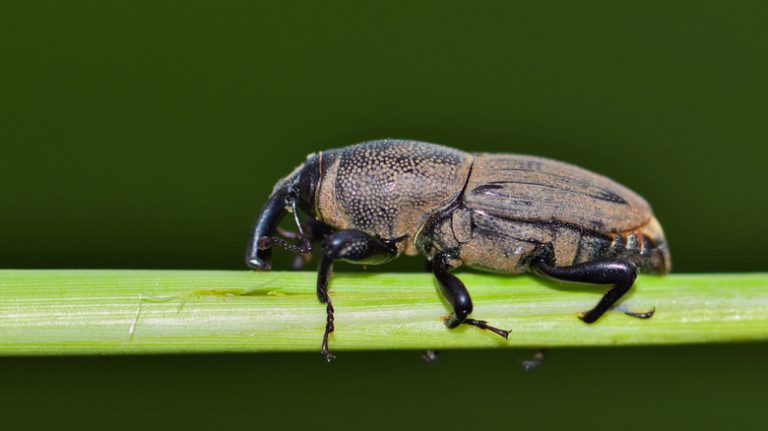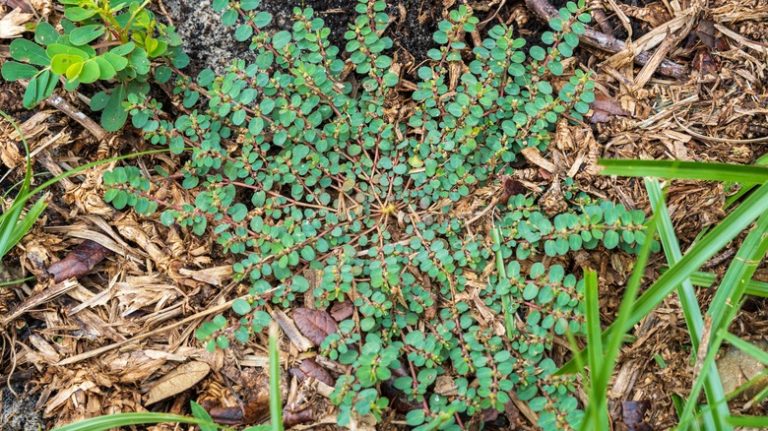Cinnamon is a common household spice used for just about everything from flavoring sweet treats to adding some cozy fragrance to a space, but not all critters love its distinct scent and flavor as much as humans do. Several varieties of insects, like ants, fruit flies, wasps, and weevils, are repelled by cinnamon, as well as a wide variety of small animals like rats, raccoons, and even snakes. Most pests are put off by cinnamon because it contains eugenol, a flavoring agent commonly found in our spice cabinet, and many bug sprays.
Because of this, cinnamon, in its many different forms and iterations, can be used as a fairly effective and safe pest repellant. Unfortunately, however, a teaspoon sprinkled over the lawn or a cinnamon stick left on a countertop isn’t the be-all-end-all of pest control. For larger issues and infestations, especially if you’re dealing with bugs or critters that could harm your family or create an unsanitary environment inside the home, it’s better to invest in more powerful repellants and call out a professional. Cinnamon can help out in a pinch if you’re simply deterring a curious rabbit from your garden or warding off fruit flies from the ripening bananas on your counter, but it’s not nearly a powerful enough solution to completely solve a major pest problem.
1. Sprinkle ground cinnamon on soil
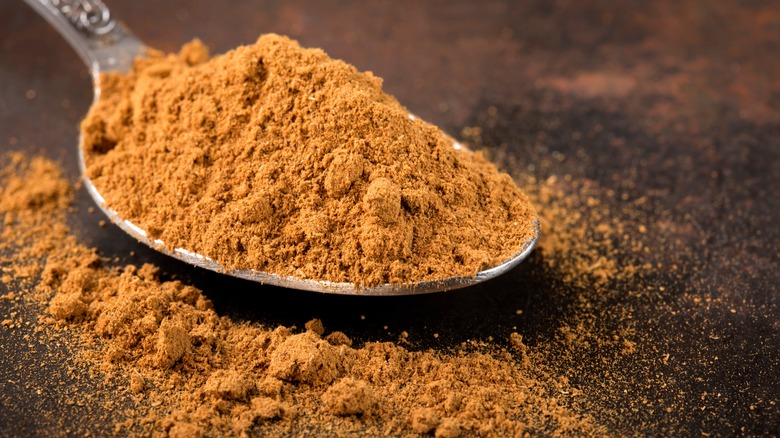
Ground cinnamon is likely the form of the spice you already have sitting in your spice cabinet, and it is also coincidentally the simplest way to spread the scent over a wide area, like your garden. To help ward off animals who take a nibble of your plants’ leaves or chow down on your homegrown crops before you can harvest them, sprinkle a bit of cinnamon over the soil. If you’re worried about potential dangers to your family dog, you can rest assured that small quantities of the spice are non-toxic, even if directly consumed.
2. Place a couple sticks in your fruit bowl
Fruit flies and ants are some of the most annoying pests to find around your house, thanks to how fast they reproduce and spread, especially after they’ve found a place to set up camp. If you want to get rid of them once and for all, you can take a couple of different approaches. Dropping a couple of cinnamon sticks in your fruit bowl can help to eliminate this area as a gathering spot for bugs, allowing you to protect your fruit, drive pests towards any traps you have set up, and even add a bit of pleasant fragrance.
3. Create a spray for plants
Hxyume/Getty Images
If you’re tackling a large area where you want to repel pests, consider making a cinnamon spray. To do this yourself, you need 2 teaspoons of cinnamon, 4 cups of warm water, a strainer, a couple of drops of rubbing alcohol, a couple of drops of dish soap, and a spray bottle. Mix the cinnamon into the water and set it out for at least a few hours to steep — as if you were making tea. Strain out the liquid to ensure it doesn’t clog up your spray bottle, pour it in, and then add the rubbing alcohol and dish soap.
4. Bury cinnamon bark in mulch
Mariia Boiko/Shutterstock
For a nearly undetectable way to incorporate cinnamon into your outdoor spaces — that will not easily wash away with rain or watering, consider mixing some cinnamon bark into your mulch. This is a more expensive approach than using ground cinnamon because whole sticks are typically more costly to purchase, but it should yield results for a longer amount of time. To do this yourself, simply mix some cinnamon sticks in the next time you mulch, making sure to utilize the largest number of pieces around the plants that more frequently fall victim to pests.
5. Sprinkle cinnamon in your trash cans
C. Hamilton/Shutterstock
Trash cans, thanks to their unpleasant smells and frequently edible contents are hotspots for all types of pests, from ants to raccoons. Thankfully, most of the creatures that are conspiring to dig through your scraps are also not the biggest fans of cinnamon, so if you find that your trash cans are frequently tipped over or full of unwelcome visitors, consider adding a sprinkle of cinnamon to the inside of your bins the next time you take out the garbage. This is a quick fix and likely won’t deter every pest, but it should improve the situation until the garbage truck stops by.
6. Create cinnamon-scented cleaning products
Grusho Anna/Shutterstock
Creating your own natural cleaning products is a great way to feel more confident in the ingredients you’re using around your home, save some money, and ensure you end up with a squeaky clean space. If you want to take it a step further, however, consider adding some cinnamon essential oil to add fragrance to your spray and help deter pests. Mix 8 ounces of distilled water, 8 ounces of vinegar, and 20 drops of cinnamon essential oil in a spray bottle. After cleaning, you and any would-be pests should notice a lovely spiced fragrance left behind on your surfaces.
7. Apply cinnamon essential oil on cotton balls
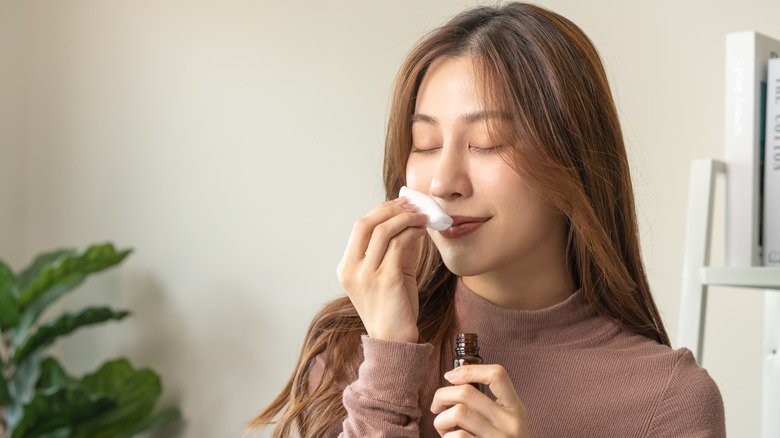
Kmpzzz/Shutterstock
If you like the idea of using essential oils to bring more of a cinnamon scent into your spaces but don’t want to have to make a spray or cleaning product with them, consider applying some to a cotton ball or pad. This scented cotton can be left wherever you have a pest problem — in cabinets, on counters, or even in the refrigerator — and easily moved or removed if you no longer want the fragrance in that area. After leaving the cotton ball in one spot for a week or two, check to see if it’s still emitting fragrance and replace it as needed.
8. Incorporate cinnamon into your décor
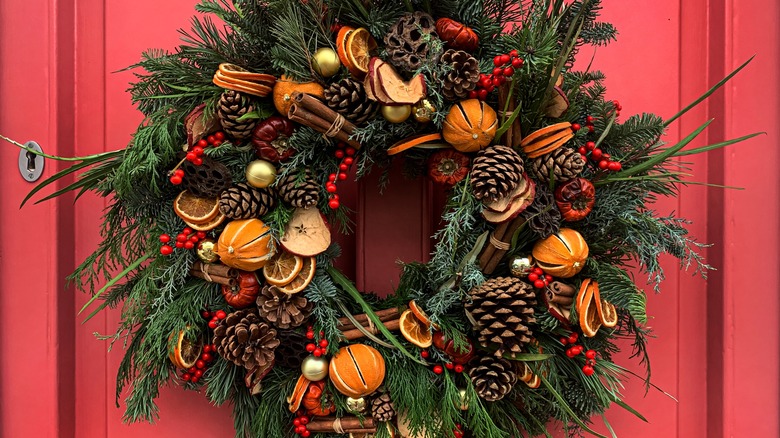
Alla Tsyganova/Shutterstock
Using a household spice as an inclusion in your next DIY décor piece might seem strange at first glance, but it’s much more common than you might think. Cinnamon sticks are a popular ingredient in festive wreaths, garlands, and potpourri, among other winter decorations, and decorative broomsticks scented with cinnamon are a frequent find around Halloween. It might be more difficult to find a way to incorporate cinnamon scents during the warmer months of the year, but handmade decorations that bring a pleasant fragrance to a space and repel pests are never out of season.
9. Use an essential oil diffuser

Josep Suria/Shutterstock
Essential oil is one of the most concentrated forms of cinnamon that you can use in your space, so why not fill your home with the fragrance? If you are trying to repel mosquitos or other flying insects indoors, add a few drops of cinnamon essential oil to the water in your diffuser. In seconds, you’ll be relaxing in a cloud of cozy fragrance that can help to discourage pests from visiting the area. If you have pets, however, be wary that cinnamon essential oil can be toxic for them if it comes into direct contact with their skin or is ingested.
10. Add cinnamon to your bird feeder
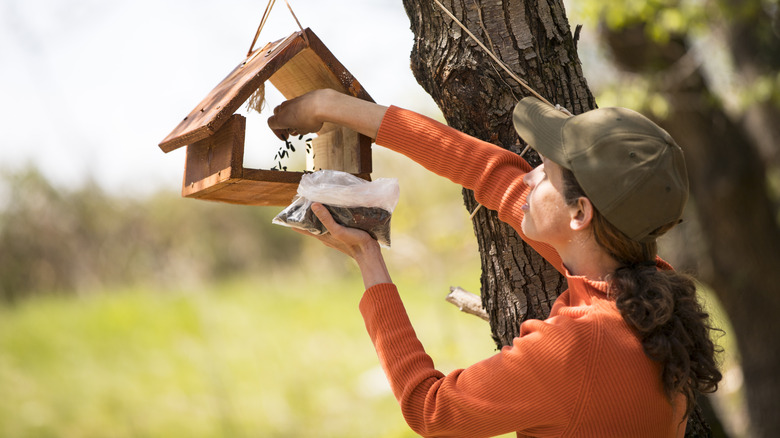
Kmatija/Getty Images
Adding a bird feeder to your space is a great way to observe and help out local avian populations, but, in many cases, squirrels clear out the seeds and nuts you’ve left out before any birds get a chance to stop by for a snack. If you’re looking for a safe way to reduce this issue, consider sprinkling cinnamon over your birdseed. Cinnamon isn’t an effective deterrent for most birds and can even be a beneficial supplement to their diets, but squirrels and many other potential mammalian or insectile visitors aren’t big fans of the spice’s powerful and warm scent.
11. Place a cinnamon stick by windows and doors
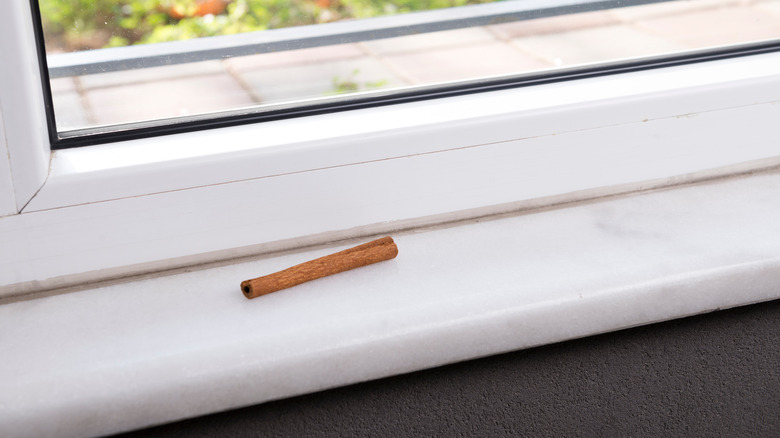
Levent Konuk/Shutterstock
Because cinnamon sticks help ward off pests like ants, weevils, and mosquitos, placing one by your window or above your doorway can help to fend off any curious buggy visitors. The process is simple — just put your cinnamon sticks where the pests are most likely to get in, then replace them as the scent fades. It’s important to remember, however, that this is a pest repellant, not an extermination method. If you already have an infestation, you must work with a professional to solve the problem before trying out natural DIY solutions.
12. Light cinnamon candles
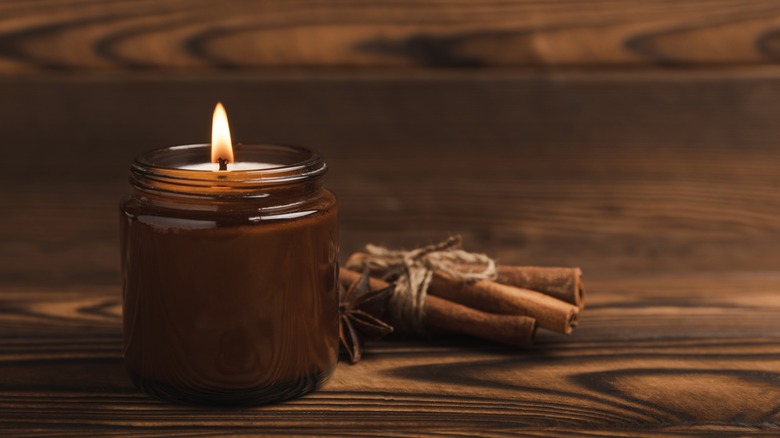
Avocado_studio/Shutterstock
Cinnamon is one of the most common inclusions in fall and winter-themed candles, but this spice can help to deter pests year-round. Fill your home with the scent of a DIY or store-bought candle for a cozy blanket of protection, bring one to light while you sit outside to help fend off mosquitos, or regularly light them next to entrances where bugs would be more likely to find their way inside. Make sure to keep an eye on any open flames, however, and try your hand at some convenient hacks to keep your candles burning longer.
13. Make a simmer pot

Rolf Karlsson/Getty Images
Most people regularly light candles, use room sprays or diffuse essential oils to keep their home smelling fresh, but one often-overlooked method to accomplish the same task is the simmer pot. To make your own, fill a pot with water and your choice of aromatic herbs, spices, and fruit. Leave it on the stove to boil — topping off with water as necessary, to fill your home with the pleasant scent of whatever ingredients you’ve chosen. This is a great way to repurpose citrus peels you would’ve otherwise thrown out, especially when you consider how perfectly oranges pair with cinnamon.
14. Put cinnamon sticks in dry goods containers
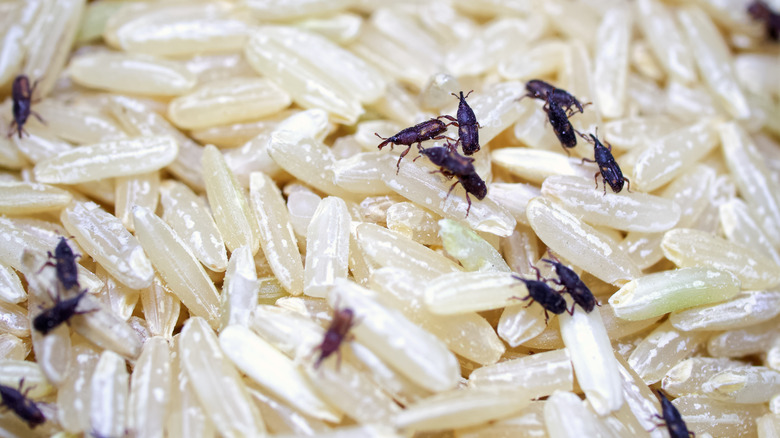
Apisit Hrpp/Shutterstock
If you frequently have a lot of dry goods on hand, whether flour, rice, or beans, you know it pays to be cautious of weevils. These little bugs are well-known for infesting pantries to feed on ingredients, leaving you with an unpleasant surprise the next time you go to bake a dessert or prepare dinner. To protect your food, vacuum-sealed containers are a good first line of defense. For an added layer of assurance, however, you can also add a cinnamon stick into the container — weevils are strongly repelled by cinnamon.
15. Sprinkle cinnamon over houseplants
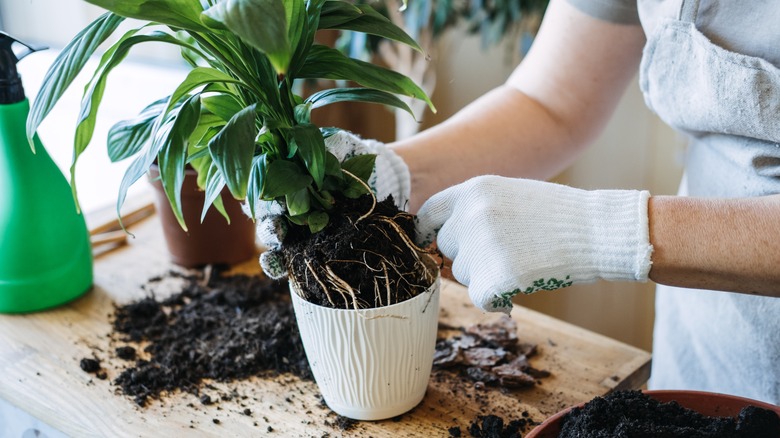
Iryna Imago/Shutterstock
Sprinkling cinnamon directly on the floor or over your surfaces is less than ideal if you want to keep your home looking and feeling clean, but if you have a particular area of focus where you want to ward off pests, consider dusting a houseplant’s soil with cinnamon and moving it into the general area. Cinnamon is completely safe for plants and can even act as a fungicide, so adding a bit of the spice to your soil can allow you to create a more portable and mess-free scent bomb if you only have the ground stuff on hand.
16. Burn cinnamon incense

AliceCam/Shutterstock
Incense is another common way to eliminate odors and add a refreshing scent to a space, but many people tend to stick with classic scent profiles like sandalwood, lavender, and frankincense. While slightly less common, you can also purchase and burn cinnamon incense if you’re specifically looking to ward off pests. It is important, however, to be careful with something that emits such a powerful smell if you have furry friends around. Many animals are more sensitive to scent than humans, so heavy fragrance and smoke can trigger underlying respiratory issues. Always burn incense in a well-ventilated space away from pets.
17. Grow your own cinnamon tree
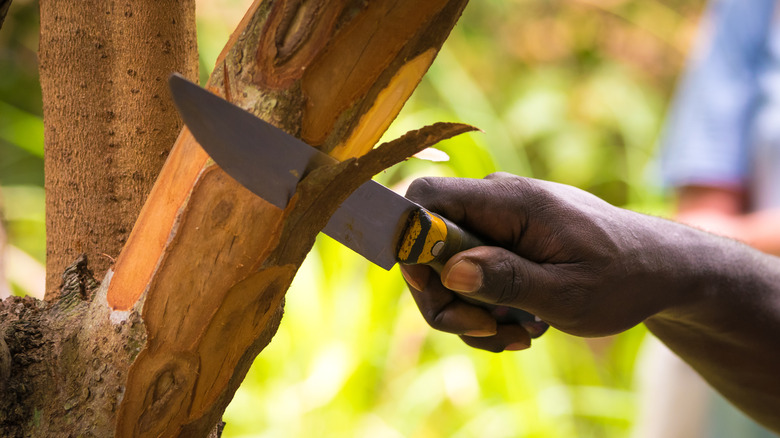
Ciprian23/Shutterstock
Cinnamon might be something you think you can only happen upon in the aisle of a grocery store, but it’s actually possible to cultivate it yourself. If you live in a very warm climate, you can grow cinnamon trees outdoors. The leaves don’t release a scent, but the bark emits a strong cinnamon smell and can be harvested and dried to use in cooking. While it grows, however, you should have a blanket of protection in your yard — pests will likely give your space a wide berth to avoid coming face-to-face with the source of such a strong fragrance.
